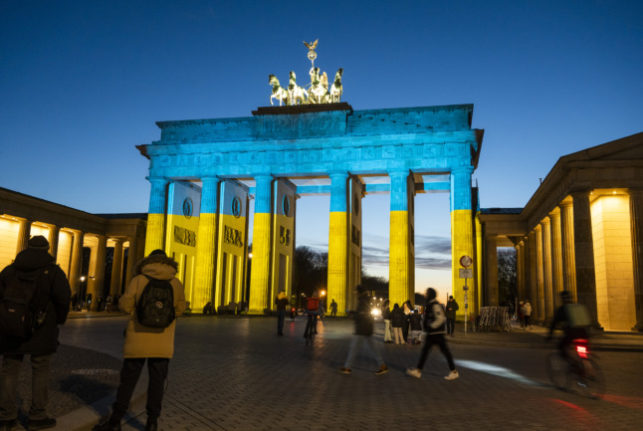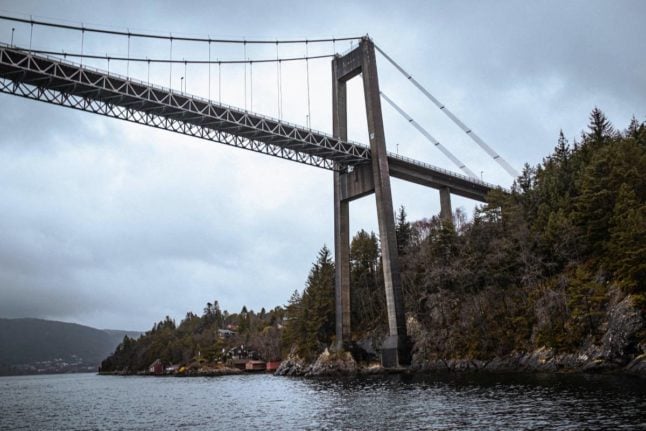In the early hours of Thursday morning Russia invaded Ukraine after weeks of high tension with western leaders and years of military action in the east of the country.
As the announcements filtered through news outlets, Ukrainians living in countries across Europe woke up to a reality they had long been dreading.
In a survey of The Local’s Ukrainian readers, the most common feeling expressed was the utter shock that their country had been invaded, followed by deep and real fears that they may never see their friends and family again.
Others spoke about the impact on their identity as a Ukrainian, the frustration of not being able to help and fears of not being able to go back home.
‘It makes me feel unsafe and worried’
“I have nowhere to go back to,” said Karina Karnaukh, 32 year-old Senior Business Development Manager living in Stockholm but originally from Dnipro. “I’ll most likely lose my job and thus will have to ask for refugee status in EU.
“This is a tragedy happening in the middle of Europe.
“I fear for the lives of my parents and my little sisters. What can happen? No one knows.”
Dmytro, a 35-year-old Software Engineer living in Copenhagen but originally from the city of Kharkiv, said: “I have family members and friends living in Kharkiv and other Ukrainian cities. They have been okay so far, but I am worried about their well-being. I am in a safe and privileged position compared to them, but I can do very little to help.”
Another Copenhagen-based Ukrainian resident named Andrii, originally from Transcarpathia in Western Ukraine said: “My parents are there, my brother is in Kyiv, my friends and other family members are there. I feel continuous stress and helplessness. I won’t be able to go back if Russia occupies beloved Ukraine.”
A 37-year-old Software Engineer in Berlin expressed fears for their family, including a disabled father, and said: “I need to figure out how I can help them to flee the country.”
Another anonymous respondent said: “I just hope my sister and mother can join me in Sweden”.
Irena, 24, who works as a kindergarten teacher in Aarhus, Denmark, but is originally from the Odessa region said she “cannot stop crying” and added her biggest fear is that her family will be killed.
Viktoria, an IT Consultant in Munich, Germany, said: “It makes me feel unsafe and worried because a lot of my friends and relatives live in Kyiv. I feel like I have gone back in time and now it is June 1941. It is a horrible and surreal feeling.”
The mention of June 1941 refers to the day when Germany attacked Ukraine as World War II raged. Later that year, the country was divided between two German administrative units.
Viktoria, from Kyiv added: “My fear is if the US and the EU don’t help and block the Russian aggression, the EU will also become an unstable place where there is no democracy but only military power rules the world.”
The Ukrainian diaspora in Europe
According to Reuters, there are 260,000 Ukrainians living in the Czech Republic, and tens of thousands in both Slovakia, Poland and Hungary. It is estimated there are around 40,000 Ukrainian nationals in France whilst Germany and Spain are home to over 100,000 Ukrainian nationals. Italy numbers over 240,000. Sweden (estimated 12,800), Austria (12,600) Switzerland (6,500) Denmark (8,000) and Norway (7,200) are also home to thousands of Ukrainians.
Andre, 37, a Software Engineer who lives in Mannheim, Germany, but is originally from the Ukrainian city of Cherkasy said: “The impact is mostly psychological. We don’t have any close relatives in Ukraine, but we planned to go home as usual near Easter. I need to work, but it’s extremely complicated now since I keep scrolling the news feed.”
READ ALSO: EXPLAINED: How Italy could be impacted by Russia’s invasion of Ukraine
Most readers told The Local they are receiving support from friends and colleagues in their country of residence. However, many expressed dismay at the level of support on an international level and from regional authorities.
When asked about his biggest fear, an investment analyst from Zurich who asked not to be named, said: “Ukraine will be bombed and cultural heritage will be destroyed. People will be killed. I worry for my immediate family living there now.”
Julia, 32, a Quality Assurance Engineer in Stockholm, said her biggest fear is: “Occupation of Ukraine with other countries only sending their thoughts and prayers or just raising their concerns.”
Julia also expressed her disbelief that her country was at war with Russia and added that her employer has offered her additional days off from work.
Olha, a 38-year-old IT specialist in Stockholm, said about the war: “It will impact the lives of all European people, not only Ukrainians.”



 Please whitelist us to continue reading.
Please whitelist us to continue reading.
Really sad
Lighting up Brandenburg Gate is about as helpful as soccer players taking the knee. Germany should worry less about lights and more about implementing actual meaningful sanctions. Of course that would mean hard times for Europe because they get oil from Russia, but it would be a sanction that might actually have an effect on Putin. Sadly we live in an age where virtue signaling, which doesn’t really cost anybody anything, has replaced actual sacrifice in the interest of what is good and right.